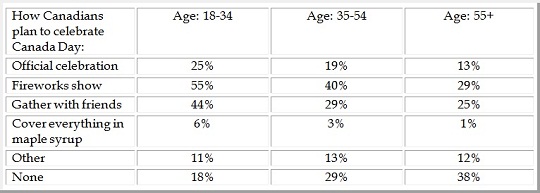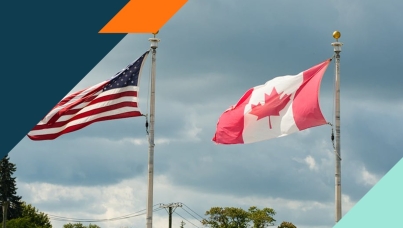As Canada Celebrates its Birthday, Eight out of Ten Canadians Confess that "Eh" is in their Vocabulary
To begin, eight of ten Canadians acknowledge that "eh" is part of their vocabulary, but one in four (26%) Canadians confess that they say it every day. Half of Canadians (49%) say they use it occasionally and one in ten (6%) say it only when talking to Americans, eh? The other 19% claim it never crosses their lips.
The stereotype of living in igloos seems to be the least truthful stereotype, which likely comes as no surprise to Canadians - only 16% of Canadians say they have been inside an igloo. Other supposed traditions are more accurate: most have been in a canoe (73%) or on a snowmobile (65%) - but, only 12% have had the chance to go out dogsledding.
Hockey is our national winter sport, and it's easy to see why. Six in ten (58%) say they are hockey fans with 18% calling hockey the greatest sport on earth and 40% saying they are a casual fan. But that leaves 43% just as happy to change the channel from Hockey Night in Canada. Three in ten (30%) say they are not much of a fan, and one in ten (13%) are "sick to death of hearing about hockey all the time".
When it comes to Canadian symbols, the beaver ranks up with the maple leaf, and a majority of Canadians (64%) have seen a beaver in the wild. Of course, beavers aren't the only wildlife associated with Canada. The data reveals that most Canadians have also seen a moose (60%), a loon (59%) or a bear (55%) in the wild. Meanwhile 16% of Canadians have never seen any of these animals.
For a patriotic snack, it's hard to top Canadian bacon. In fact, Canadians named back bacon (35%) as Canada's national food, beating poutine for the top spot (30%). Atlantic or Pacific salmon (17%) came a distant third followed by beavertails (8%), tourtiere (6%), and doughnuts (4%).
In the spirit of Canada Day, respondents were asked which musician they are proudest to call Canadian. Four in ten (38%) chose Celine Dion from a list which also included The Tragically Hip (14%), Nickelback (11%), Blue Rodeo (9%), Drake (6%), Justin Bieber (2%), or some other musician or group (20%).
If you're going for a Canadian look, make sure you've got the right outfit. When asked to identify the "most Canadian" article of clothing, one half said the toque (50%), placing it firmly in the top spot. Two in ten (18%) said plaid shirt or parka (17%), while just 5% said longjohns and 10% said none of these is the most Canadian.
When it comes to the actual celebration of Canada Day, seven in ten (71%) Canadians are going to mark the occasion. Plans include watching a fireworks show (40%), gathering with friends (32%), attending an official celebration (18%), even by covering everything in maple syrup (3%) or doing something else (12%). However, 29% of Canadians will not be celebrating with the rest of the nation. Why not, eh?
Which Canadians are Saying What... Or Eh?...
When looking deeper into the responses of Canadians on truly Canadian questions, we find that:
These are some of the findings of an Ipsos Reid poll conducted between June 12th and June 15th, 2015, on behalf of Historica Canada. For this survey, a sample of 1,005 Canadians from Ipsos' online panel was interviewed online. Weighting was then employed to balance demographics to ensure that the sample's composition reflects that of the adult population according to Census data and to provide results intended to approximate the sample universe. The precision of Ipsos online polls is measured using a credibility interval. In this case, the poll is accurate to within +/ - 3.5 percentage points, 19 times out of 20, had all Canadian adults been polled. The credibility interval will be wider among subsets of the population. All sample surveys and polls may be subject to other sources of error, including, but not limited to coverage error, and measurement error.
For more information on this news release, please contact:
John Wright
Senior Vice President
Ipsos Public Affairs
(416) 324-2002
[email protected]
Anthony Wilson-Smith
President & CEO
Historica Canada
(416) 506-1867
About Ipsos in Canada
Ipsos is Canada's market intelligence leader, the country's leading provider of public opinion research, and research partner for loyalty and forecasting and modelling insights. With operations in eight cities, Ipsos employs more than 600 research professionals and support staff in Canada. The company has the biggest network of telephone call centres in the country, as well as the largest pre-recruited household and online panels. Ipsos' marketing research and public affairs practices offer the premier suite of research vehicles in Canada, all of which provide clients with actionable and relevant information. Staffed with seasoned research consultants with extensive industry-specific backgrounds, Ipsos offers syndicated information or custom solutions across key sectors of the Canadian economy, including consumer packaged goods, financial services, automotive, retail, and technology & telecommunications. Ipsos is an Ipsos company, a leading global survey-based market research group.
To learn more, please visit www.ipsos.ca.
About Ipsos
Ipsos is an independent market research company controlled and managed by research professionals. Founded in France in 1975, Ipsos has grown into a worldwide research group with a strong presence in all key markets. Ipsos ranks third in the global research industry.
With offices in 87 countries, Ipsos delivers insightful expertise across five research specializations: brand, advertising and media, customer loyalty, marketing, public affairs research, and survey management.
Ipsos researchers assess market potential and interpret market trends. They develop and build brands. They help clients build long-term relationships with their customers. They test advertising and study audience responses to various media and they measure public opinion around the globe.
Ipsos has been listed on the Paris Stock Exchange since 1999 and generated global revenues of e1,669.5 ($2,218.4 million) in 2014.
Visit www.ipsos.com to learn more about Ipsos' offerings and capabilities.




